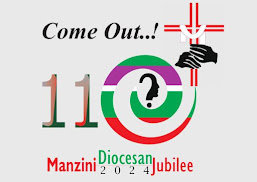(Holy Friday - homily)
Each one of the four evangelists narrates the passion in a particular way. Luke, for example, shares deep words of compassion ("Father, forgive them, they do not know what they are doing") which are not found in any of other gospels. Every year on Good Friday we read the passion from the Gospel of John who does not include the prayer in Gethsemane and for whom Jesus today reveals his glory.
The very first time we read in John that Jesus reveals his glory is in the very familiar passage of the wedding at Cana. After the sign of the wine we read: “This was the first of Jesus’ signs: it was at Cana in Galilee. He revealed his glory”.
We are fine with that. We are even happy about it. Jesus changed water into wine. Jesus transformed a possible moment of sadness into a deep moment of joy.
Things, though, change later in the Gospel. You might remember what we read on the Sunday before Palm Sunday. Some people wanted to see Jesus. Phillip and Andrew tell Jesus about. Jesus replied: “Now the hour has come for the Son of man to be glorified. In truth I tell you, unless a wheat of grain falls into the earth and dies it remains only a single grain; but if it dies it yields a harvest…” (12: 23 – 28).
The tone changes. Jesus starts linking his being glorified with his dying.
It is difficult for us easily accept it because our own idea of glory is different. For us glory speaks of honor, homage, power, success, red carpets, being famous, having many followers on social media while Jesus' idea is full of insults, beatings, rejection...
It always strikes me to read in the other gospels that during the passion people repeat one thing over and over again: save yourself, save yourself and we will believe. I would say that this is how people understood and still understand the meaning of “glory”: saving oneself no matter what.
Last week I had a meeting with members of our Caritas Eswatini team. We are working on the "bishop's school fees' project" which we run every year. I was then told a story of what happened some years' ago.
As people were queuing outside the Caritas offices in Manzini to apply for financial help, a man appeared out of nowhere and told some people that there was a way to speed up a process: it would be enough to collect some money and take it to the offices of Caritas Eswatini in Mbabane. The people - not aware that there are no Caritas Eswatini offices in Mbabane - believed the man, gathered the money and met him outside some offices in Mbabane the following day. The man took their money and asked to wait for him. He was never seen again.
One certainly becomes angry at the thought of someone who was ready to abuse those most in need for his own benefit but we cannot ignore the attitude of those who believed could jump the queue ignoring the rest who are in the same situation.
The attitude is that world might fall around me but I’ve made it. I do not care if the rest don’t or what happens to them. “Save yourself”.
It happens at every level of our society, from the highest to the lowest. It is an attitude that is exactly the opposite to the one Jesus followed to give us life.
For Jesus, "to be glorified” it is to die so that the world might live. We are grateful to Jesus for that but deep in our hearts we are aware of the consequences, those who follow him will be called to do the same: “Anyone who loves his life loses it; anyone who hates his life in this world will keep it for eternal life” (John 12: 25).
It might sound unrealistic but
- isn’t this the reality of many parents and grandparents who "give up" their lives for their children? In fact – the opposite – a parent with an attitude of “I save myself” finishes by losing himself / herself and also hurts the children;
- isn’t this what many families have done in our country when they took the children of their relatives who died and gave them an education? They made a choice "to die" so that those children could live;
- isn't this what we continue to witness in the lives of those involve in health institutions as we go through a pandemic?
- isn’t this what we see in our priests and sisters who generously serve our communities?
Jesus today reveals his glory by loving with an unconditional love, a love that goes as far as dying and dying on a cross.
At a time when COVID19 is challenging us to rebuild our society, are we going to build it under the “save yourself” attitude or under Jesus’ glory where only by dying we can have and give life? The choice is yours and mine.




